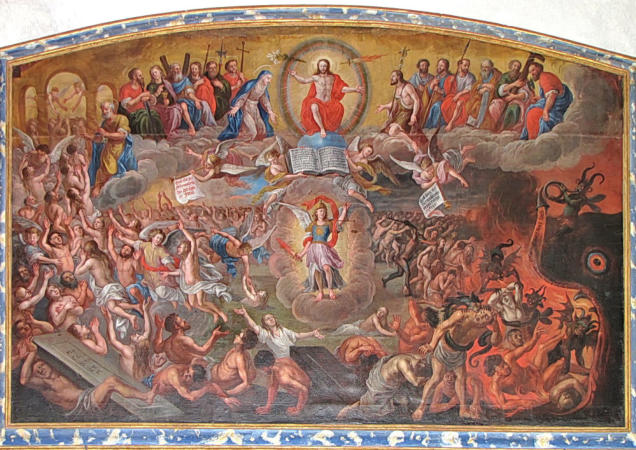Hell is like that bit of family history that the whole family knows about but tries to avoid in polite conversation. The only family member who talks about it is the crazy uncle who has no couth. Some family members do their best to deny that piece of the family story altogether. We can focus on the pleasant things and not deal with that nasty bit.
But it just will not do. That part of the family story turns up time and again. It simply cannot be buried.
Hell is an unpleasant subject (except for the crazy uncle). The thought of eternal torment is not a sterile academic issue. It is personal. It is emotional. It provokes strong visceral reactions. If hell is real, then that means dead family and friends may be there. If hell is real, then that means I have to face the reality of there being severe, eternal consequences to the way I live my life. I would rather deny it all together as some bit of medieval superstition that was used to keep the ignorant under control.
Throughout the history of the Christian faith, many within the pale of the faith have found the Scriptures’ teaching concerning hell so distasteful that they have tried to explain it away. No small attempt was made recently by erudite Orthodox theologian David Bentley Hart in his book, That All Shall Be Saved: Heaven, Hell, and Universal Salvation. At most, theologians such as Hart see Hell as a purgatory of sorts, a temporary punishment and cleansing, but not an eternal dwelling. However, Hart and the “Christian universalists” have to turn Scripture to an odd position and squint just right to defend their position.
The Scriptures are clear: Hell is a place of eternal punishment for those who reject Christ Jesus. There is no getting around it. Jesus himself, the embodiment of love, mercy, and grace, is recorded many times teaching on the realities of hell. (cf. Mt 25.31-46; Mk 9.42-50; Lk 16.19-31; et al.) Denying its existence or its everlasting nature will not do. We must follow the Scriptures wherever they lead and adjust our lives accordingly.
Hell is a place just as real as heaven. It was created for the devil and his angels. They will be joined in torment by all those who share in their rebellion against God and his Christ. (Mt 25.41ff.) Once the sentence is declared after death, it is irreversible. (cf. Heb 9.27) God has given each of us a stewardship in this life, and death is the summons to court to give an account for that stewardship, whether we have been faithful or unfaithful as his image-bearers. Those who have not been faithful, those who have rejected God’s grace in this life, refusing to walk in his ways, will be consigned to everlasting fire. (Mt 3.12; 13.42, 50; 25.41, 46; Mk 9.43ff.; cf. also Rev 14.10-11; 20.10, 15; 21.8) There will be no reprieve.
The nature of this fire is debated. Is it merely metaphorical, an image that stands in for something else, or is it a literal, physical, touch-and-you-are-burned fire? It is both. I don’t know exactly how this works in our intermediate state between death and bodily resurrection, but if the joys of heaven can be experienced in the presence of Christ in that state, then the horrors of hell can be as well. On the last day, every human that has ever lived will be raised bodily, some to the resurrection of life and others to the resurrection of judgment. (Jn 5.28-29) We will all receive bodies that will be able to enjoy the fullest expressions of human joy in a new heavens and new earth or the fullest expression of human pain in the horrors of Hell. That embodied existence means that there will be physical, tactile pain and pleasure. Physical fire eternally consuming a body is not unthinkable. If God can do it with a bush, then he can do it with a resurrected body.
But the fire runs deeper. When the rich man in hell lifted up his eyes, he asked for mercy, begging Abraham to send Lazarus with a drop of water to cool his tongue, to give him a split-second of reprieve from the torment. The desires of those in hell will burn within them forever without the slightest gratification. Are you sexually immoral, gratifying yourself outside of the bounds of God’s laws? In hell, your desires will burn with greater intensity without any temporary relief. Are you a glutton and drunkard? You will hunger and thirst without a crumb of bread or drop of wine. Are you angry, discontent, and hateful? Those desires will flame up within you without ever being able to be gratified. The fire burns within as well as without.
What makes this fire worse is that it is not the absence of God but his unmediated presence. He is a consuming fire. (Heb 12.29) Those who suffer the torments of hell do so in the presence of the holy angels and the Lamb. (Rev 14.12) The fire is God’s presence in wrath that is drawing out the unending bile of sin in your own heart and consuming you with it without ever being burned up completely.
Jesus believed this place to be such a horror to avoid that he told his disciples to take extreme measures to avoid it; cutting off hands and feet and gouging out eyes. (Mk 9.42-50) Take sin seriously. Deal with it appropriately. The end of a life consumed with sin is the second death in the lake of fire. (Rev 20.11-15)
Those who avoid hell are those who rely upon and pledge their fealty to the one who took hell for them at the cross and in the grave.















